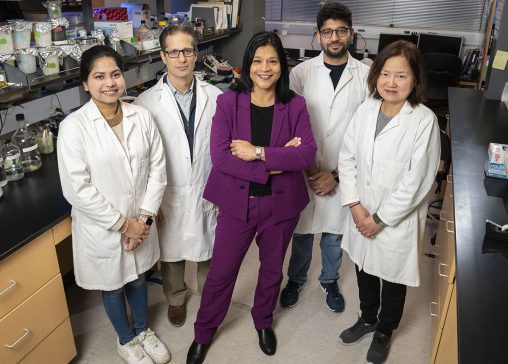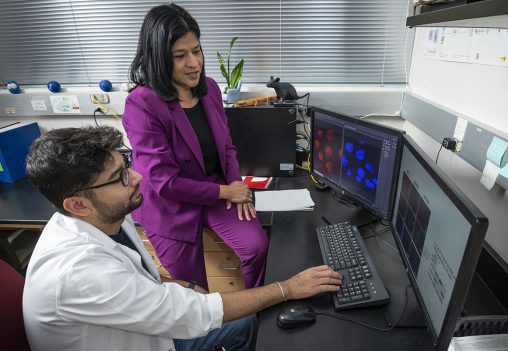
From left: Vijayalakshmi Jogi, doctoral student; Michael Craig, Ph.D., research associate professor of biochemistry and molecular biology; Madhavi Kadakia, Ph.D., vice provost for research and innovation and professor in the Department of Biochemistry and Molecular Biology; Akshay Hira, biomedical sciences Ph.D. student; and Jin Zhang, Ph.D., research associate in the Department of Biochemistry and Molecular Biology. (Photos by Erin Pence)
Madhavi Kadakia, Ph.D., vice provost for research and innovation and professor in the Department of Biochemistry and Molecular Biology at Wright State University, has been awarded a federal grant to develop strategies to combat therapeutic resistance in head and neck cancer.
Kadakia received a five-year R01 award from the National Institutes of Health National Cancer Institute for Wright State University. The project will receive $651,120 in funding in its first year and a total of $3.026 million over five years.
The new project is based off a study Kadakia’s lab recently published that identified a novel role for the protein TIP60 in promoting the rate head and neck cancer cells grow and divide. The team’s findings showed that TIP60 promotes the stability of ΔNp63α, an oncogene that is frequently elevated in squamous cell carcinoma and is linked to resistance to cisplatin.
In the United States, over 1 million people are diagnosed annually with head and neck squamous cell carcinoma (SCC) cancer. Standard therapies involving ionizing radiation and treatment with the chemotherapeutic drug cisplatin are initially effective. However, many patients develop resistance to these therapies, leading to squamous cell carcinoma (SCC) recurrence.
“The five-year survival of patients with recurrent SCC remains near 55% despite recent advancements in head and neck cancer treatment,” Kadakia said. “We urgently need new strategies that sensitize tumors to the standard of care drugs like cisplatin.”
Kadakia’s lab will work to identify the specific signaling mechanisms by which TIP60 promotes therapeutic resistance through ΔNp63α. The team will also test the therapeutic potential of TIP60 inhibitors by determining if blocking TIP60 function sensitizes tumors to cisplatin and ionizing radiation.
“This research grant will allow us to elucidate novel mechanisms of cisplatin resistance in SCC, thus opening new avenues for much-needed treatment strategies for chemoresistant cancers,” Kadakia said.
The study is led by Kadakia in collaboration with Weiwen Long, Ph.D., Michael Craig, Ph.D., Michael Kemp, Ph.D., Ramzi Nahhas, Ph.D., and Nicholas Shamma, M.D. from Wright State; John Turchi, Ph.D., and Joseph Dynlacht, Ph.D., at Indiana University; James Rocco, M.D., Ph.D., at The Ohio State University; and Ramakrishna Kommagani, Ph.D., and Hari Krishna Yalamanchili, Ph.D., at Baylor College of Medicine.
An internationally recognized cancer researcher, Kadakia has a notable history of federal funding. Much of her research has focused on identifying signaling pathways that play a role in cancer and its development and identifying biomarkers to differentiate stages of cancer and potentially shed light on personalized treatments for patients.

Madhavi Kadakia’s lab will collaborate with researchers at Indiana, Ohio State and Baylor universities to develop strategies to combat therapeutic resistance in head and neck cancer.
Kadakia was appointed vice provost for research and innovation at Wright State in 2022.
She joined the university’s faculty in 2002 and became a professor in the Department of Biochemistry and Molecular Biology in 2013. Her previous roles include chair of the Department of Biochemistry and Molecular Biology, associate dean of research affairs at the Boonshoft School of Medicine and associate director of the Center for Genomics Research.
In addition, Kadakia is an ELAM (Executive Leadership in Academic Medicine) Fellow and a steering member of the Group on Research and Development of the Association of American Medical Colleges committee and a member of the nominating committee for the Association of Public and Land-Grant Universities Council of Research.
Kadakia received her Ph.D. in infectious disease and microbiology from the University of Pittsburgh and her master’s degree and bachelor’s degree in microbiology from the University of Mumbai, India. Following her doctoral studies, Kadakia completed a postdoctoral fellowship at the Pittsburgh Cancer Institute at the University of Pittsburgh. She has also conducted research at the Cancer Institute of New Jersey.

 Wright State names Rajneesh Suri dean of Raj Soin College of Business
Wright State names Rajneesh Suri dean of Raj Soin College of Business  ‘Only in New York,’ born at Wright State
‘Only in New York,’ born at Wright State  Wright State president, Horizon League leaders welcome new commissioner
Wright State president, Horizon League leaders welcome new commissioner  Wright State celebrates homecoming with week-long block party
Wright State celebrates homecoming with week-long block party  Wright State baseball to take on Dayton Flyers at Day Air Ballpark April 15
Wright State baseball to take on Dayton Flyers at Day Air Ballpark April 15 